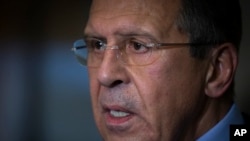Russia on Saturday expressed its support for elections in Syria and said it was ready to help Western-backed Free Syrian Army rebels.
Russian Foreign Minister Sergei Lavrov said Moscow wanted Syria to prepare for parliamentary and presidential elections, and he indicated his government would take firm action if necessary to move that process forward.
Speaking on Russian state television, Lavrov said the Kremlin was intensifying its drive “to convert its increased clout with Damascus into a political settlement.” He did not, however, give details about how there could be a transition from years of civil war in Syria, with an enormous toll of casualties and displaced civilians, toward a political settlement.
"External players cannot decide anything for the Syrians," he said. "We must force them to come up with a plan for their country where the interests of every religious, ethnic and political group will be well protected. ... They need to prepare for both parliamentary and presidential elections."
In contrast to Moscow's previous broad statements about Syrian politics, Lavrov's comments appeared to signal a specific call by the Kremlin for political renewal in the war-torn country.
The Russian foreign minister criticized U.S. policy on Syria and denied Western charges that Russia's airstrikes in Syria had indiscriminately targeted Western-backed rebels as well as Islamic State extremists.
Lavrov said Russia's air force would be ready to help units of the "patriotic opposition" in Syria — specifically, the Free Syrian Army — if it knew their whereabouts. He contended that the U.S. and its allies had refused to provide information about the rebel units' locations, or to "coordinate" their anti-terrorist campaign against Islamic State extremists with Russia's military.
"I repeat: The Americans' refusal to coordinate their anti-terrorist campaign with us is a big mistake," Lavrov said. "We are seriously prepared for such coordination. Though we are denied information on the terrorists' whereabouts ... we are ready to give air support to the patriotic opposition, including the so-called Free Syrian Army. But we need to get in contact with the people who will have the authority to represent certain armed groups which are fighting against terrorism, among other things."
Rebels: Stop bombing
Reacting to Lavrov’s statement, Free Syrian Army rebel fighters said that Russia must stop bombing them before talking about helping them.
The rebels rejected Moscow’s idea of elections, which they suspect as a strategy for keeping President Bashar al-Assad in power.
Russia's Foreign Ministry said Lavrov spoke by telephone Saturday with U.S. Secretary of State John Kerry, who was in Jordan to discuss the possibility of organizing talks between the Syrian government and the opposition. The ministry said Lavrov and Kerry exchanged views "on the need to utilize the potential of other countries in the region to advance the political process."
No statement by the U.S. State Department was immediately available. Kerry flew from Jordan to Saudi Arabia late Saturday for more talks on tensions between Israelis and Palestinians.
In Vienna on Friday, where he met face to face with Lavrov, Kerry spoke optimistically about the possibility of cooperating with Russia to find a political solution for Syria. The U.S. secretary added, however, that Moscow and Washington still had disagreements about Assad's role in Syria's political future.





